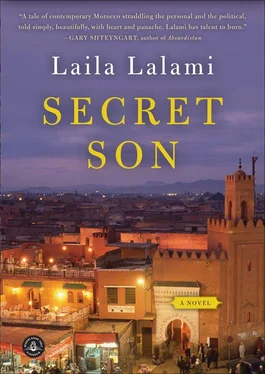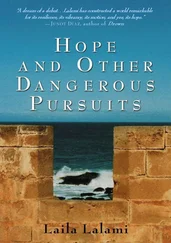Youssef frowned. “Are you calling my mother a whore?”
“No, no, no,” Nabil said, raising his hands and leaning forward, as though to signal to Youssef to keep his voice down. “I am just asking.”
“When did my mother leave your employ?”
This boy liked to use complicated expressions. Why couldn’t he say “her job,” like everyone else? Nabil rubbed his chin, making a show of thinking. In truth, he had no idea. He remembered Rachida well enough, but he was fuzzy on the details.
“It was in November,” Youssef said.
“Okay,” Nabil said, ready to accept this date as easily as any other.
“And I was born June 25.”
Six months younger than Amal, Nabil thought. Good Lord.
“What do you do?” he asked. “Do you go to school?”
Youssef nodded. “I’m about to finish my first year in college, going into my second.”
“And what are you studying?”
“English.”
“Oh,” Nabil said. Almost by instinct, he wanted to boast about Amal’s studies in America. Then he restrained himself. He was not sure how much he wanted to tell the boy yet.
“I’ve been top of my class so far,” Youssef added in a casual tone, though his eyes fixed Nabil’s.
Nabil could not suppress a smile; at least the boy wasn’t an imbecile, like so many young people these days. The door of the restaurant swung open and a woman entered, her tight-fitting black dress showcasing generous breasts and round hips. She went to sit at a table with a friend. Nabil turned his attention back to Youssef and found him staring at the woman with the same expression of lust he knew must have been on his own face only seconds before. There was nothing unusual about a young man of Youssef’s age looking at a pretty girl, and yet Nabil could not help seeing something of himself in that lust for the fairer sex, which, despite his being a husband and father, had consumed him for many years. It did not have to be the result of heredity; it could just as easily be a coincidence, but now Nabil was starting to believe he could not dismiss every detail as happenstance. In a whisper, he asked, “How is your mother?”
“She’s fine,” Youssef said. Thinking about it for a moment, he added, “She’s not very happy with me.”
“And why is that?” Nabil spoke with benevolent concern, when in truth he was terrified of what the existence of Youssef meant, for him as well as for his family. Yet from the moment he had cast his eyes on this younger version of himself, he had been unable to look away.
Youssef shrugged. “She has certain ambitions for me.”
“There’s nothing wrong with that,” Nabil said, somewhat defensively.
“She wants me to be … like her dreams of me,” Youssef said. There was a calm conviction in his voice, and it made Nabil feel sorry for Youssef’s mother, for what she must be going through with her boy.
Their orders arrived. Youssef picked up his fork. On the back of his right wrist was a large scar in the shape of a paper clip — a testament to events Nabil knew nothing about.
“So who do you want to be?” Nabil asked.
“Myself.”
Nabil wanted to ask, And who are you? But he knew the answer would take years to unfold. And all this time, he had been living across town, going about his life, working at his business, watching his nephews grow, lamenting the lack of a male heir — unaware that he had had one all along, someone he could have groomed, someone with whom he could have shared what only fathers and sons can share, someone he could have cherished alongside Amal.
Youssef cut a small piece of crayfish and examined it carefully before placing it in his mouth.
“Do you like seafood?”
“I’m not sure,” Youssef said, looking up, his eyebrows knitted in a quizzical frown.
Nabil’s thoughts wandered helplessly to Amal. She adored seafood. When they went to the south of France on vacation, she ate moules frites every night until she got sick. She had spent one evening bent over the toilet bowl in their hotel room, Nabil holding her forehead as she threw up. And the next day she had ordered something else from the seafood menu. How much had he missed about this boy’s life? The things that a father knows about his son — the kind of food he likes, the soccer team he cheers for, the girl whose photo he keeps tucked in a book — all this he had missed.
“It’s an acquired taste,” Nabil conceded, lifting his fork and spearing a piece of sole meunière . “It takes some getting used to.” He had many questions for Youssef, but each one he had posed so far had been met with a broad reply. He tried something else. “You said your mother didn’t know you were coming to visit me.”
Youssef nodded.
“Are you going to tell her when you get back home?”
“Probably.”
“You’re not sure?”
“What do you think? Should I tell her I found you?” His tone was halfway between calm authority and veiled threat.
Nabil was not used to being addressed this way by anyone, much less by someone of Youssef’s age or station, and yet instead of being annoyed, he was completely helpless. It was as though the boy could see through him, could see how much he had always wanted to have a son. “I don’t think you should yet,” he said, his voice throaty.
“Then I won’t.”
Nabil took another sip of scotch.
“What about you?” Youssef asked, chin raised. “Will you tell your wife?”
“No.” Nabil was too embarrassed to explain that he could not face his wife if such a revelation were to come out.
“What about your daughter?”
Nabil sat up. “How do you know I have a daughter?”
“The photo on your desk.”
“I see. What about her?”
“Will you tell her?”
Youssef stared so intently that Nabil felt forced to explain, “We’re not speaking right now.”
The waiter came to clear their plates. Nabil noticed Youssef looking at his watch, but he ordered a cup of espresso anyway. “What does your mother do?” he asked. “Does she work?”
Youssef blinked. For the first time, his self-assured manner seemed to vanish. “Of course she works,” he said. “She’s a clerk at the hospital.” A pause, and then that defiance returned. “What else could she have done after what happened to her?”
Nabil tilted his head, not knowing whether he should agree or disagree with the boy. In reality he did not feel a sense of responsibility over what had happened because he was still engulfed in the feeling of surprise — he had not known. Suddenly he wondered what he would have done had Rachida not disappeared. He would probably have found her a job somewhere after the abortion, given her some money to get started again. He could not have imagined, back then, that he would spend his life yearning for a son. He finished his espresso and paid the bill.
THEY WALKED OUT of the restaurant. Nabil offered Youssef a ride, but he declined, saying he would just walk his lunch off, and he turned around and walked away. Nabil felt a pinch in his heart, a disappointment that their time together had already come to an end. He ran after Youssef. “Wait. Where do you live?” he asked, realizing that he had not thought of asking this most basic question during the meal.
“Hay An Najat.”
Good Lord. In a slum. Nabil was revolted at the thought that his offspring, his flesh and blood, an Amrani whose ancestors had fought battles and won wars, conquered land and ruled clans, been part of the power structure of this country for as long as anyone could remember, lived in a place like Hay An Najat. It made his blood rise to his cheeks. “That’s very far from here,” he said, keeping his voice as neutral as he could manage. “Are you sure you don’t need a ride?”
Читать дальше












